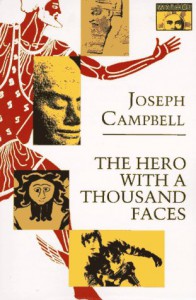
The Hero With a Thousand Faces

The idea that there is no such thing as an original story isn’t even original in of itself. Joseph Campbell may have coined the monomyth, but writers and orators have been following set standards and conventions for thousands of years. What set THE HERO WITH A THOUSAND FACES apart is that it applies these conventions to worldwide religious/mythological beliefs and human psychology.
Whether or not the titular hero is a worthwhile concept depends entirely on how much the reader likes seeing Nietzsche’s übermensch conflated with the Aristotelian tragic hero and Freudian id. Campbell draws from a wide variety of sources for his analyzes, and he correlates them all to spirituality and a shared subconscious with some success. At the same time, Campbell’s comparative approach makes multi-faceted classic heroes and gods appear dull and shallow in contrast to the one-off monsters or problems they encounter. If Campbell has to remove key elements of his examples in order to make them fit his theory, shouldn’t that invalidate his claims of the hero’s universal appeal?
Campbell’s thesis is compromised by the time in which it was written. HERO WITH A THOUSAND FACES primarily uses Freudian psychanalysis to support his claims, and he unfortunately embraces very outdated conventions in the process. Perhaps due to the academic writing conventions of the time, he also tends to over-describe everything. The end result is that Campbell goes on and on about evidence or theories that I, as a modern reader, know for a fact are inherently flawed without his adding any significant insight.
The biggest problem with the book is that Campbell wildly misinterprets his subject matter. While it’s easy to grasp basic ideas Campbell presents, the text itself fails to substantially support them. His ideas often prioritize the functions of gender or hierarchy, but the numerous supporting examples he gives prioritize action and effect instead. The discrepancy could be explained by overreliance on 20th century gender roles, but Campbell is the first to claim that gender doesn’t matter. The contradictions are rarely resolved because he goes on to write about the dreams of random strangers or completely different myths instead. It’s telling that best written parts of the book are where Campbell focuses on obstacles instead of archetypes.
Many of his sources date from the 1930s or before, and it shows. Even though he goes out of his way to condemn some of his peers’ imperialistic attitudes, Campbell can be just as judgmental. His opinions and exotification of aboriginal practices in particular is damning enough, but his some of his scientifically improbable “sources” read more like propaganda or bad pulp fiction. It wouldn’t be a problem if these segments weren’t used to support huge chunks of the monomyth. The issue is not a matter of offensiveness; if I can’t trust the accuracy of the material, I cannot trust the analysis thereof either.
My pagan book club had a lot of fun discussion about the book, though, so at least I’m not walking away with a completely negative experience. Not recommended for solitary reading, in any case.

















